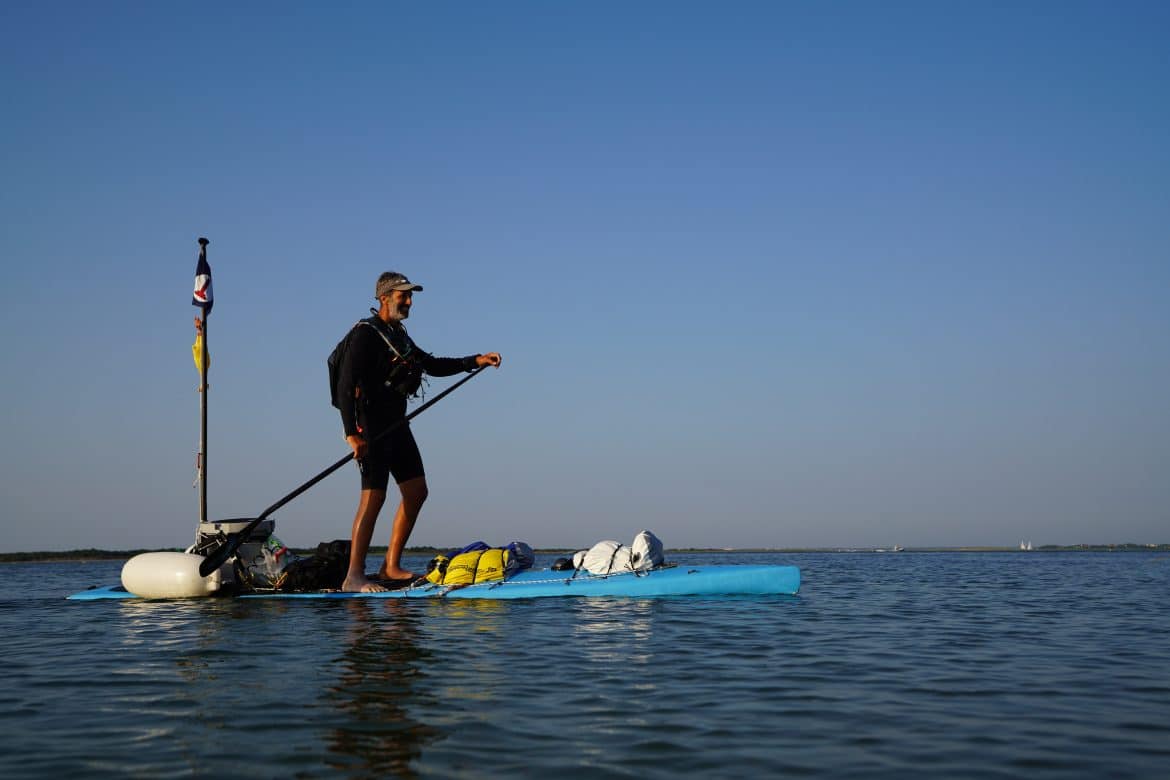Adam Nagler stepped off his paddle board and onto the sand of Brant Point Tuesday evening, completing an astounding 450-mile solo trek up the eastern seaboard from Virginia.
“I’ve always wanted to come in at Brant Point Light,” Nagler said as he walked gingerly ashore around 6:30 p.m. last night to a cheering crowd of supporters.
 Twenty-four days after setting out on his improbable journey, Nagler made it to Nantucket with a thick beard, almost 30 pounds lighter, his lower legs stricken by cellulitis, and a ripped piriformis muscle that left him bruised. Still, he was all smiles at the completion of his feat of endurance, as friend Jim Mondani doused him with champagne and he was embraced by the leaders of the organization benefiting from his expedition, Fairwinds: Nantucket’s Counseling Center.
Twenty-four days after setting out on his improbable journey, Nagler made it to Nantucket with a thick beard, almost 30 pounds lighter, his lower legs stricken by cellulitis, and a ripped piriformis muscle that left him bruised. Still, he was all smiles at the completion of his feat of endurance, as friend Jim Mondani doused him with champagne and he was embraced by the leaders of the organization benefiting from his expedition, Fairwinds: Nantucket’s Counseling Center.
As Nagler stumbled slightly and bent over in exhaustion, he was asked how he planned to celebrate last night.
“A bowl of Frosted Flakes and milk,” Nagler said. “Put my feet up and sleep for a few days.”
Nagler, 54, set out on his trek from Cape Charles Light in Virginia on Saturday, July 3. Almost immediately, he was forced off the water while Tropical Storm Elsa charged up the coast. And that was just the beginning of the challenges he would face.
Off the coast of Virginia, Nagler was sleeping on his paddle board when he “got taken out by an 8-foot wave in the middle of the night in a place I’d never been before.” Tethered to a sea anchor line, Nagler’s training kicked in and he quickly assessed the situation and gathered his equipment, checking to make sure nothing had been lost.
But that was not even close to the most difficult part of his journey.
When he set out from Sea Girt, New Jersey in mid-July, Nagler was embarking on a 62-mile, open-ocean crossing to Fire Island, New York. As he was navigating the middle of the shipping lanes going into New York City, Nagler ripped his piriformis muscle amid six-foot seas and winds of 18 knots. “I almost had to hit the SOS button on my unit for the first time ever,” he said. “I even thought about it, but I didn’t.”
He forged ahead in agony. “I’m lying in the water and a 1,200-foot container ship is way too close to me, I can barely breath, and I’m screaming in pain,” Nagler recalled. “It was morphine-worthy pain, on and off for 17 hours until I got to shore.”
 Over the course of three-plus weeks on the water, in which he stopped only periodically onshore to regroup or avoid storms, Nagler saw all manner of wildlife – “absolutely everything” he said. One night about five miles offshore in the early part of his trip, Nagler awoke to a pair of dolphins that stayed with him for hours, popping their heads up in the moonlight. He also recalled “the day of the shark” off Long Beach Island, New Jersey.
Over the course of three-plus weeks on the water, in which he stopped only periodically onshore to regroup or avoid storms, Nagler saw all manner of wildlife – “absolutely everything” he said. One night about five miles offshore in the early part of his trip, Nagler awoke to a pair of dolphins that stayed with him for hours, popping their heads up in the moonlight. He also recalled “the day of the shark” off Long Beach Island, New Jersey.
“I saw more sharks in one day than I’ve seen in 10 years on the water,” Nagler said. “A 10-foot lemon shark swam right under me, going the opposite direction, and didn’t pay me any mind.”
His diet consisted of one thing and one thing only: a concentrated carbohydrate and electrolyte powder called Tailwind. He packed 35 pounds of it on his board at the start of his journey, and by the time he arrived at Brant Point, there were only two packets left.
Reflecting in the moments after coming ashore, Nagler explained the physical and mental challenges he faced, and how he tamed them both over the course of 450 miles on the water.
“It’s always a balance between the two,” Nagler said of the mental and physical aspects of long distance paddle boarding. “Ultimately, your physical can only carry you so far. It’s amazing how little things can make a big difference. I gave myself a ginger chew as my treat every night. I made it so I couldn’t wait for that. That’s completely a mental thing, something I created. You give yourself these building blocks. The mental component overtakes, but I trained the mental side of it.”
Dubbed “Deep Fog Direct,” Nagler’s paddle board expedition is raising funds for Fairwinds’ sliding fee and free behavioral health services. Fairwinds announced on Monday that all donations made in honor of Nagler’s journey would be matched by the Clausen Family Foundation, who were inspired by his “spirit and grit”
Nagler said yesterday that a close high school friend who is a veteran of U.S. wars and suffers from post-traumatic stress disorder had credited his own local mental health services agency with saving his life. As he considered an island non-profit to support through his paddle board trek, that relationship and those memories led him to select Fairwinds as a beneficiary, an agency he had no prior connection to.
During the COVID-19 pandemic, Nagler said, “The simple things became very difficult, foundational stuff went out the window, and who was there to support the community but Fairwinds in an amazing time of need. Every time I talked to them, they had to cut it short because they had a crisis. They were constantly in crisis mode for so long, and I think mental health services go underserved all over the world.”
Click here to donate to Fairwinds in support of Nagler’s effort, and make sure to enter the name of his journey – “Deep Fog Direct” – in the notes section of your gift entry.






